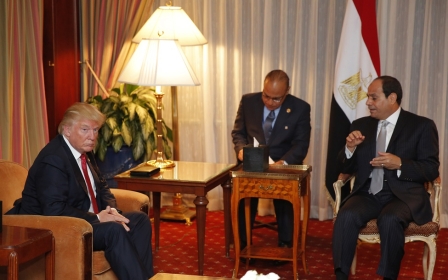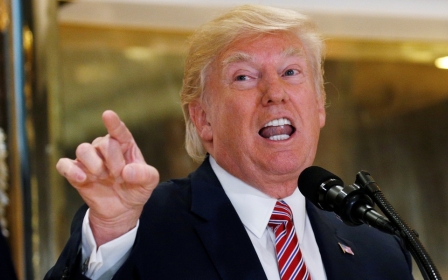Trump pardons controversial former Arizona sheriff Joe Arpaio

US President Donald Trump on Friday granted a pardon to former Arizona lawman and political ally Joe Arpaio, the self-proclaimed "toughest sheriff in America," less than a month after he was convicted of criminal contempt in a case involving his department's racial profiling policy.
"Throughout his time as sheriff, Arpaio continued his life's work of protecting the public from the scourges of crime and illegal immigration," said the White House statement announcing Arpaio's pardon.
Trump had signalled this week that his first presidential pardon would go to Arpaio, 85, whom he has frequently praised for his hardline immigration stance.
"I think he's going to be just fine, OK? I won't do it tonight because I don't want to cause any controversy," Trump had said at a rally in Phoenix on Wednesday.
The former sheriff was convicted of wilfully violating a court order to stop targeting Hispanics in immigration roundups.
Arpaio, who lost a bid for re-election in Arizona's Maricopa County in November after 24 years in office, was known for his crackdown on undocumented immigrants and investigating unfounded Trump-supported claims questioning former President Barack Obama's citizenship.
Before Trump granted the pardon, the American Civil Liberties Union, which sought the court injunction against Arpaio, said it would be "a presidential endorsement of racism".
Arpaio, who campaigned for Trump in 2016, was convicted on 31 July by US District Judge Susan Bolton, who ruled he had willfully violated a 2011 injunction barring his officers from stopping and detaining Latino motorists solely on suspicion that they were in the country illegally.
Arpaio admitted to inadvertently disobeying the court order but said his behavior did not meet a criminal standard. He said the prosecution was a politically motivated attempt by the Obama administration to undermine his re-election bid.
Arpaio had been scheduled to be sentenced on 5 October and faced a fine and maximum sentence of six months in jail.
His controversial tenure as sheriff brought Arpaio national headlines for massive roundups of suspected illegal immigrants and for the way he ran the Maricopa County jail.
He reinstated chain gangs, made inmates wear uniforms that were pink or old-fashioned black and white stripes and forbade them coffee, salt and pepper.
Gorka leaves
Meanwhile, White House senior adviser Sebastian Gorka resigned late on Friday over Trump's handling of a military buildup in Afghanistan.
"Given recent events, it is clear to me that forces that do not support the MAGA [Make America Great Again] promise are – for now – ascendant within the White House," Gorka wrote.
"The fact that those who drafted and approved the speech removed any mention of radical Islam or radical Islamic terrorism proves that a crucial element of your presidential campaign has been lost ...
"Just as worrying, when discussing our future actions in the region, the speech listed operational objectives without ever defining the strategic victory conditions we are fighting for. This omission should seriously disturb any national security professional, and any American who is unsatisfied with the last 16 years of disastrous policy decisions which have led to thousands of Americans killed and trillions of taxpayer dollars spent in ways that have not brought security or victory," he said.
On Monday, three Democratic US senators wrote to senior administration officials seeking confirmation on whether Gorka was under criminal investigation for failing to disclose his membership in a Hungarian neo-Nazi organization.
Gorka "reportedly concealed his membership in the Vitezi Rend, a far-right anti-Semitic Hungarian organization with historical ties to the Nazis, when he applied for US citizenship," the senators said in Monday's letter.
Middle East Eye propose une couverture et une analyse indépendantes et incomparables du Moyen-Orient, de l’Afrique du Nord et d’autres régions du monde. Pour en savoir plus sur la reprise de ce contenu et les frais qui s’appliquent, veuillez remplir ce formulaire [en anglais]. Pour en savoir plus sur MEE, cliquez ici [en anglais].




